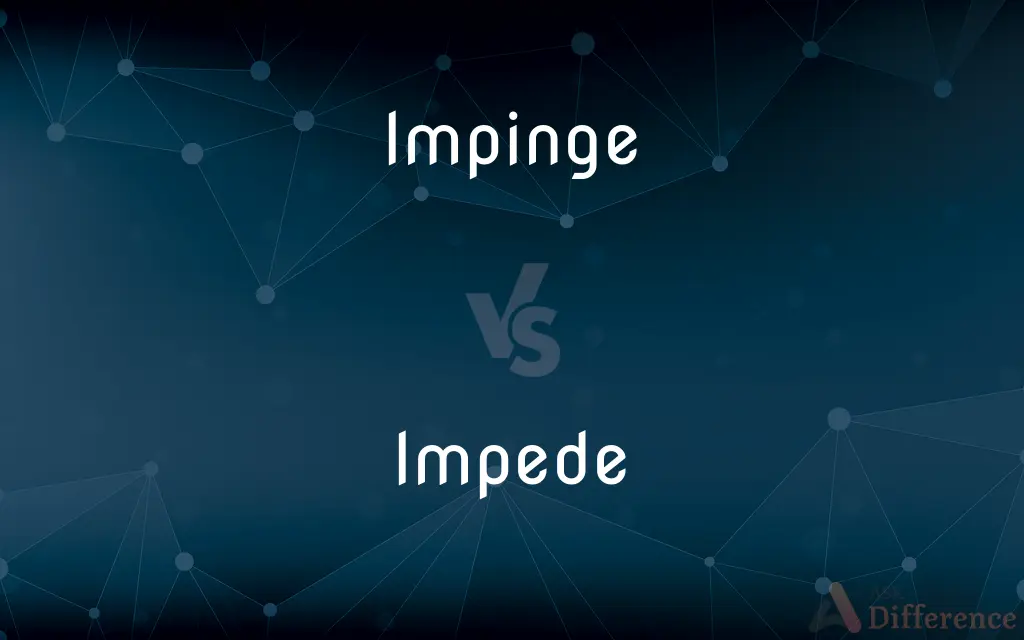Impinge vs. Impede — What's the Difference?
Edited by Tayyaba Rehman — By Urooj Arif — Updated on April 1, 2024
Impinge involves direct contact or influence, often abruptly affecting something, whereas impede refers to hindering progress or movement, without implying direct contact.

Difference Between Impinge and Impede
Table of Contents
ADVERTISEMENT
Key Differences
Impinge typically describes an action where something directly affects or encroaches upon something else, suggesting a more immediate and often invasive interaction. This can include physical contact or an impact on one's rights or personal space. Whereas impede focuses on the act of slowing down or obstructing progress, movement, or action, without necessarily involving direct contact or an invasive moment. It's more about creating barriers or obstacles that delay or prevent something from happening.
Impinge can also carry connotations of intrusion or unwelcome influence, highlighting situations where something or someone makes an unwelcome impact on another. For example, loud noise from a construction site might impinge on someone's ability to concentrate. On the other hand, impede is often used in contexts where the focus is on the challenge or difficulty created by the obstruction, such as when bureaucratic procedures impede business operations.
In physics, impinge might be used to describe phenomena such as waves or particles striking a surface, emphasizing direct interaction with a physical object. Whereas, impede is rarely used in this context, and is more aligned with abstract or metaphorical barriers, like when laws are said to impede innovation.
The emotional or psychological implications of impinge can involve feelings of being infringed upon or violated, underscoring the invasive aspect of the term. In contrast, impede usually evokes a sense of frustration or delay, pointing to the obstacles that prevent forward movement or achievement.
In legal and formal contexts, impinge often relates to violations of rights or encroachments on legal boundaries, making it pertinent in discussions about privacy, property, and personal freedom. Impede, however, is more commonly associated with procedural or regulatory barriers, and is frequently used in discussions about policy, administration, and legal reforms.
ADVERTISEMENT
Comparison Chart
Definition
Directly affect or encroach upon
Hinder progress or movement
Connotation
Often negative, implying intrusion or unwelcome impact
Neutral, focusing on the act of slowing or obstructing
Usage Context
Physical contact, legal rights, personal space
Barriers, delays, procedural obstacles
Emotional Implication
Feelings of violation or infringement
Frustration or annoyance due to obstacles
Examples
Sound waves impinging on a surface, privacy being impinged upon
Regulations impeding business, traffic impeding travel
Compare with Definitions
Impinge
To encroach or infringe upon.
New regulations impinge on our freedom to travel.
Impede
To obstruct or hinder.
Underfunding impedes research advancements.
Impinge
To have an effect or impact.
The decision will impinge on all aspects of our lives.
Impede
To slow down progress.
Snowstorms impede traffic flow on highways.
Impinge
To make contact, especially in a way that is perceived negatively.
The bright light impinged on his vision.
Impede
To inhibit or restrict.
Laws can impede innovation in technology sectors.
Impinge
To influence or alter.
The novel's themes impinge upon the reader's consciousness.
Impede
To create barriers to action or movement.
Lack of information can impede decision-making.
Impinge
To strike or hit.
The hail impinged upon the car's roof, leaving dents.
Impede
To delay or prevent development.
Poor internet connection impedes online learning.
Impinge
Have an effect, especially a negative one
Several factors impinge on market efficiency
Impede
Delay or prevent (someone or something) by obstructing them; hinder
The sap causes swelling which can impede breathing
Impinge
To encroach on or limit something, such as a right
“powerful institutions of government that inhibited free enterprise and impinged on commercial—and by extension private—liberties” (Greg Critser).
Impede
To retard or obstruct the progress of. ]
Impinge
Usage Problem To have an effect or influence
“Any consequence of a change in alleles ... is fair game for natural selection, so long as it impinges on the survival of the responsible allele, relative to its rivals” (Richard Dawkins).
Impede
(transitive) To get in the way of; to hinder.
Impede someone's progress
Impinge
To collide or strike against something
Sound waves impinge on the eardrum.
Impede
To hinder; to stop in progress; to obstruct; as, to impede the advance of troops.
Whatever hinders or impedesThe action of the nobler will.
Impinge
To advance over or press upon something
Pain caused by a bone impinging upon a nerve.
Impede
Be a hindrance or obstacle to;
She is impeding the progress of our project
Impinge
To encroach upon; limit
“One of a democratic government's continuing challenges is finding a way to protect ... secrets without impinging the liberties that democracy exists to protect” (Christian Science Monitor).
Impede
Block passage through;
Obstruct the path
Impinge
To make a physical impact on.
Loud noise can impinge on the eardrum, causing temporary hearing damage.
Impinge
To interfere with.
Impinge
To have an effect upon, especially a negative one.
Impinge
To fall or dash against; to touch upon; to strike; to hit; to clash with; - with on or upon.
The cause of reflection is not the impinging of light on the solid or impervious parts of bodies.
But, in the present order of things, not to be employed without impinging on God's justice.
Impinge
Impinge or infringe upon;
This impinges on my rights as an individual
This matter entrenches on other domains
Impinge
Advance beyond the usual limit
Common Curiosities
Is it always negative when something impinges on another?
While often negative, impinging can sometimes lead to positive effects if it causes beneficial change.
What are common obstacles that impede work?
Common obstacles include bureaucratic red tape, lack of resources, and interpersonal conflicts.
How does something impede progress?
Something impedes progress by creating barriers, obstacles, or conditions that slow down, obstruct, or prevent advancement.
How can technology impede personal relationships?
Technology can impede personal relationships by distracting attention or replacing face-to-face interactions with digital communication.
Can emotions impinge on decision-making?
Yes, emotions can impinge on decision-making by influencing or altering one's judgments or actions.
How do environmental factors impinge on wildlife habitats?
Environmental factors like pollution and deforestation impinge on wildlife habitats by damaging or destroying them.
What does it mean to impinge on someone?
To impinge on someone means to intrude upon or negatively affect their space, rights, or conditions.
What legal measures can impede criminal activity?
Legal measures like stricter laws, increased surveillance, and enhanced penalties can impede criminal activity.
Can societal norms impinge on personal expression?
Societal norms can impinge on personal expression by imposing expectations or limitations on behavior.
How do health issues impede daily activities?
Health issues can impede daily activities by restricting physical capabilities or requiring significant time for treatment.
Can lack of education impinge on career opportunities?
Yes, lack of education can impinge on career opportunities by limiting access to certain jobs or advancement.
Can physical barriers impinge on an individual's freedom?
Yes, physical barriers can impinge on freedom by limiting movement or access to spaces.
What factors impede economic growth?
Factors include political instability, poor infrastructure, and lack of investment.
What strategies can help overcome impediments?
Strategies include planning, seeking alternative solutions, and removing or reducing obstacles.
Can cultural differences impede communication?
Cultural differences can impede communication by creating misunderstandings or conflicts.
Share Your Discovery

Previous Comparison
Viking vs. Valkyrie
Next Comparison
Siren vs. HarpyAuthor Spotlight
Written by
Urooj ArifUrooj is a skilled content writer at Ask Difference, known for her exceptional ability to simplify complex topics into engaging and informative content. With a passion for research and a flair for clear, concise writing, she consistently delivers articles that resonate with our diverse audience.
Edited by
Tayyaba RehmanTayyaba Rehman is a distinguished writer, currently serving as a primary contributor to askdifference.com. As a researcher in semantics and etymology, Tayyaba's passion for the complexity of languages and their distinctions has found a perfect home on the platform. Tayyaba delves into the intricacies of language, distinguishing between commonly confused words and phrases, thereby providing clarity for readers worldwide.











































